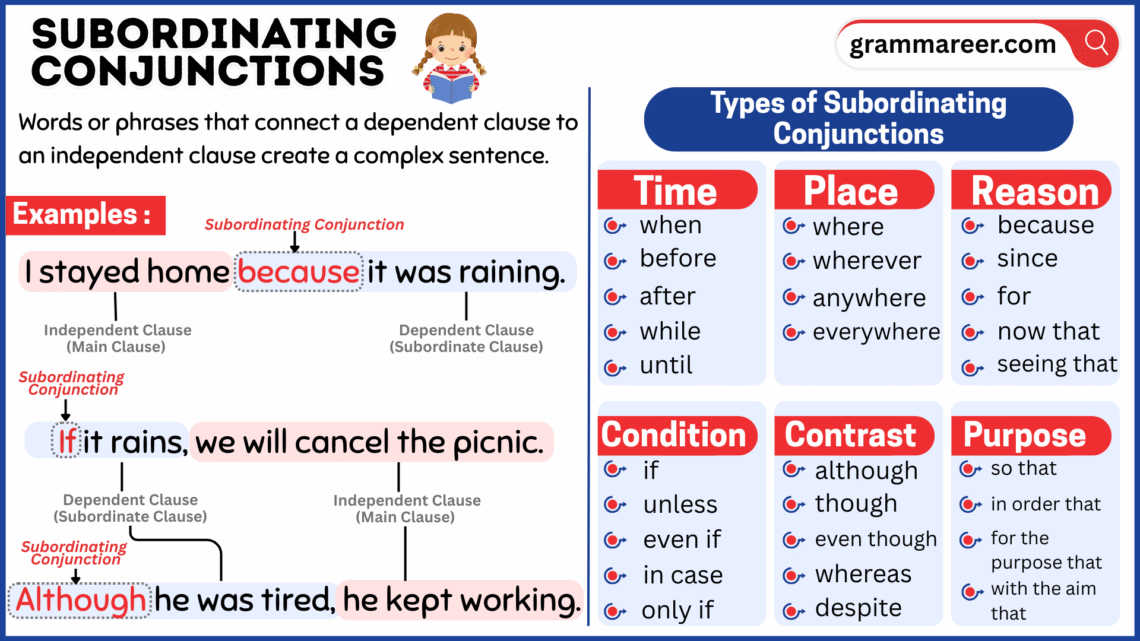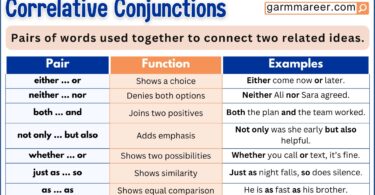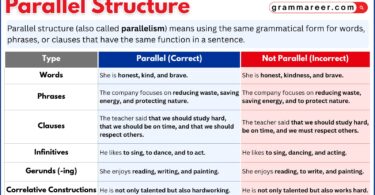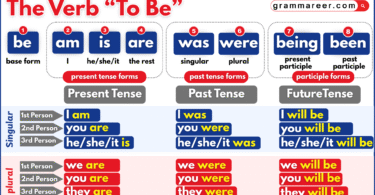Subordinating conjunctions may sound a bit tricky, but they’re actually easy to understand. These small words help connect ideas and show the relationship between two parts of a sentence.
In this article, we’ll go through what subordinating conjunctions are, how they work, and see some clear examples you can use in everyday writing and speaking.
Table of Contents
What Is a Subordinating Conjunction?
A subordinating conjunction is a word that connects two ideas in a sentence, but it does so in a way that shows one idea depends on the other. Think of it like a bridge: it links a main clause (a complete thought) with a subordinate clause (an incomplete thought that needs support).
For example:
- I stayed home because it was raining.
- Here, “because” is the subordinating conjunction. The main clause “I stayed home” makes sense on its own, but “because it was raining” only makes sense when attached to it.
- Here, “because” is the subordinating conjunction. The main clause “I stayed home” makes sense on its own, but “because it was raining” only makes sense when attached to it.
Subordinating conjunctions help show time, cause, condition, contrast, or place between ideas.
- Time: I’ll call you when I reach home.
- “when I reach home” tells us when the action happens.
- Reason: She smiled because she passed the test.
- “because she passed the test” shows why she smiled.
- Condition: You can’t play outside if it rains.
- “The action depends on a condition—whether it rains or not.
- Contrast: Although he was tired, he finished the project.
- “Although he was tired” shows contrast with the main action.
- Place: We sat where the breeze was strongest.
- “where the breeze was strongest” tells us the place.
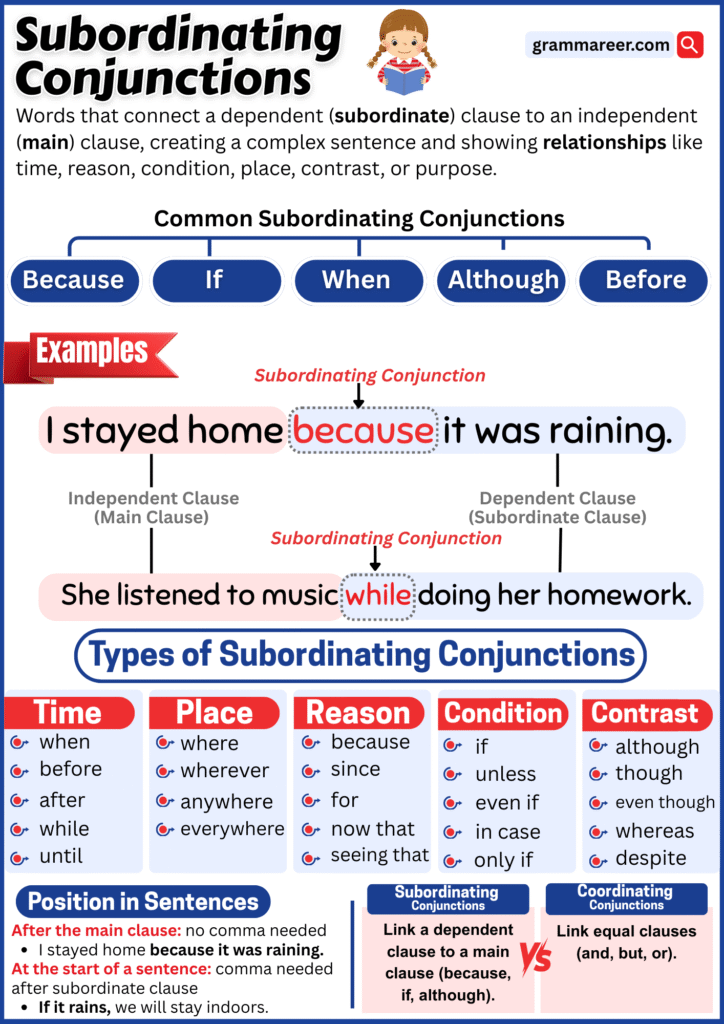
Common Subordinating Conjunctions You Can Use Daily:
Below list is a collection of subordinating conjunctions for everyday use:
| after | as soon as | as | as if | as long as |
| as much as | even if | as though | because | before |
| by the time | in order that | even though | if | if only |
| in case | since | once | only if | provided that |
| rather than | till | so that | than | that |
| though | although | unless | untill | when |
| whenever | where | wherever | whereas | while |
How to Use Subordinating Conjunctions?
Subordinating conjunctions aren’t complicated. Just keep these basics in mind:
- They can come at the start or in the middle of a sentence.
- If the sentence starts with the dependent clause, add a comma before the main clause.
- Because it was late, we decided to go home.
- If the dependent clause comes second, no comma is needed.
- We decided to go home because it was late.
- A dependent clause alone doesn’t make sense — it always needs the main clause.
Subordinating Conjunctions vs Coordinating Conjunctions
Subordinating conjunctions and coordinating conjunctions are both connectors, but they link ideas in different ways:
| Coordinating Conjunctions What they do: They join two equal things (words, phrases or independent clauses). Common ones: for, and, nor, but, or, yet, so (FANBOYS). Example: ◉ I wanted to go for a walk, but it started raining. (Both parts of the sentence are complete.) | Subordinating Conjunctions What they do: They join an independent clause (complete thought) with a dependent clause (incomplete thought). Common ones: because, although, if, since, when, while, unless. Example: ◉ I stayed home because it started raining. (The first part is complete, but “because it started raining” can’t stand alone. |
Why Subordinating Conjunctions are Improtant?
Subordinating conjunctions may look like small words, but they play a big role in joining ideas. They show us when, why, or under what condition something happens. The tricky part is not the words themselves—it’s usually knowing when to use a comma.
Rule 1: Use a comma if the subordinate clause comes first.
When a sentence begins with a subordinating conjunction, add a comma before the main clause.
- Because it was raining, we stayed inside.
- Although I was tired, I finished my homework.
Rule 2: No comma if the subordinate clause comes last.
When the subordinate clause comes after the main sentence, you usually don’t need a comma.
- We stayed inside because it was raining.
- I finished my homework although I was tired.
Think of it this way: front = comma, back = no comma.
Of course, writers sometimes add a comma at the end for a pause or special emphasis, but the general rule is pretty simple.
Examples that explain how subordinating conjunctions work
Here are a few more sentences with subordinating conjunctions. Keep in mind, subordinating conjunctions and their clauses show things like time, place, reason, condition, or contrast. In these cases, the bold parts act like adverbs, so we call them adverbial clauses.
| Subordinating Conjunction | Category | Example |
| where | Place | I like sitting where the trees give shade. |
| wherever | Place | I’ll travel wherever my friends are going. |
| after | Time | We’ll eat after the guests arrive. |
| as soon as | Time | Call me as soon as you reach home. |
| as long as | Time | You can play outside as long as it doesn’t get dark. |
| before | Time | Wash your hands before dinner is served. |
| once | Time | I’ll relax once my homework is done. |
| because | Reason | I stayed home because I wasn’t feeling well. |
| in order that | Reason | She spoke loudly in order that everyone could hear her. |
| even if | Condition | I’ll join you even if I’m busy. |
| if | Condition | If it’s sunny, we’ll go for a picnic. |
| in case | Condition | Take an umbrella in case it rains. |
| although | Concession | Although it’s cold, I’m not wearing a jacket. |
| though | Concession | He went jogging though he was tired. |
| even though | Concession | She smiled even though she was sad. |
FAQs
Subordinating conjunctions are little words that connect two parts of a sentence — one that can stand alone (independent clause) and one that cannot (dependent clause). They help us build complex sentences instead of just simple ones.
Here are a few common ones:
because, after, before, until, unless, whenever, as soon as, while, although, even though, if.
Let’s look at some easy examples:
◉ She couldn’t attend the meeting because she was stuck in traffic.
◉ We’ll wait here until the rain stops.
◉ I’ll join you for dinner if I finish my work on time.
◉ Although he was tired, he kept working on the project.
You May Also Like

